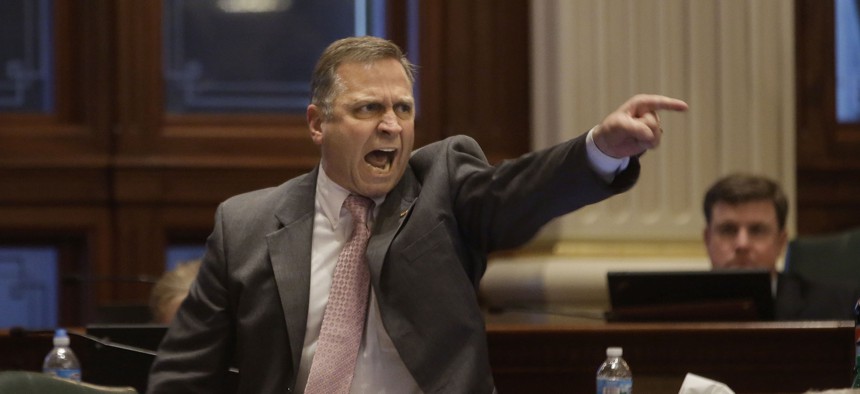Conflict Between Lawmakers Isn’t Always a Bad Thing

U.S Rep. Mike Bost, formerly a state representative, shouts in a gun debate at the Illinois state legislature in 2013. AP Photo/Seth Perlman

Connecting state and local government leaders
New research focused on local government shows that elected officials who engage in arguments over policy are more effective at governing than those who agree on everything, or those who get in petty fights.
Across the country, dissatisfaction with government is growing. Part of that disapproval stems from the view that politicians argue too much and are too gridlocked to work together on major problems.
It’s easy to see why people could grow exasperated with their elected leaders, as shouting matches are not uncommon in state legislative sessions, gubernatorial debates, city council meetings, and, of course, between elected officials on Twitter.
But new research published in the Journal of Local Government Studies suggests that, at least at the local level, conflict has some benefits. “It’s important that people understand not all conflict is the same,” said Scot Schraufnagel, the chair of the political science department at Northern Illinois University. “When we see legislators being conflictual, not all of that is bad.”
Schraufnagel, who co-authored the research with Meng Yuan, found that policy conflict—that is, when legislators argue about problems and solutions—leads to more effective governance. However, relationship conflict—when legislators engage in personal attacks or act out of spite—leads to negative outcomes.
To study the issue, Schraufnagel looked at 31 city governing bodies in Illinois, and the responses of their council members to questions about frequency and type of conflict and council effectiveness. Effectiveness was measured by members’ responses to questions about the council’s productivity, level of teamwork, sense of common direction, and willingness to innovate. Researchers also measured effectiveness by objective policy outcomes and the relative health of the city through proxies like the high school graduation rate, median household income, and the number of minority or women-owned businesses.
In cities where council members were frequently engaged in “healthy conflict” about policies, they were more likely to say the governing body was effective, and researchers concluded policy outcomes were better. “When legislators are in conflict over policy, they often come up with compromises that are better than the two alternatives they started with,” Schraufnagel explained.
In places rife with “petty and personal rivalries,” members were more likely to say the council was ineffective. Still, despite these responses, the study found their arguments had no significant effect on policy outcomes.
Schraufnagel’s work confirms the conclusions of other studies into municipal councils, which have found that conflict can often veer off course. “Conflict becomes dysfunctional when it ceases to focus on issues and becomes personal; when it is framed solely in win–lose alternatives; and when it becomes an end in itself rather than a means to an end,” reads one 2011 study published in State and Local Government Review.
Personal political conflict is familiar to most Americans because it has become so common at both the national and local level. And while the country may be tiring of hurled insults and gridlock, Schraufnagel said it hasn’t always been that way. “If you go back 50 years, people actually complained that there wasn’t enough conflict in politics,” he said. “There was an idea that Democrats and Republicans were too cozy with each other. Fast forward to the present, and that’s hard to imagine.”
While “hyperconflict” is on full display at the national level, though, Schraufnagel said that local county boards and city councils still lack conflict in some places. “When elected officials aren’t in conflict at all, they might just be a rubber stamp, and that’s not effective governing,” he said.
City councils are often deemed “rubber stamps” when they pass anything proposed by a city’s mayor or manager. A study of the Chicago city council in 2018 deemed the governing body to be a rubber stamp when it was revealed that over half of the council’s members voted in accordance with former mayor Rahm Emmanuel’s wishes over 90% of the time. According to Scraufnagel, that isn’t ideal. “No conflict isn’t a sign that things are going well,” he said.
The research on local governments is in line with Schraufnagel’s previous work that examines conflict in national politics. In earlier research, he found that moderate conflict “facilitates the production of landmark laws” but that the polar extremes of disagreement—when there is no party polarization or high party polarization—diminish legislative productivity.
“While we don’t want to see people sabotaging each other’s policies because they don’t like each other, we do want to see them disagreeing,” he said.
But Schraufnagel said that his research doesn’t mean that everyone elected should be moderates. The best public servants, he argued, are people with strong policy views who enjoy debate. “Someone could be an idealogue with strong views, and that’s not a problem,” he said. “It’s most important that our elected officials are willing to commit to courtesy and teamwork.”
Emma Coleman is the assistant editor for Route Fifty.

NEXT STORY: States Try Recruiting New Hunters





